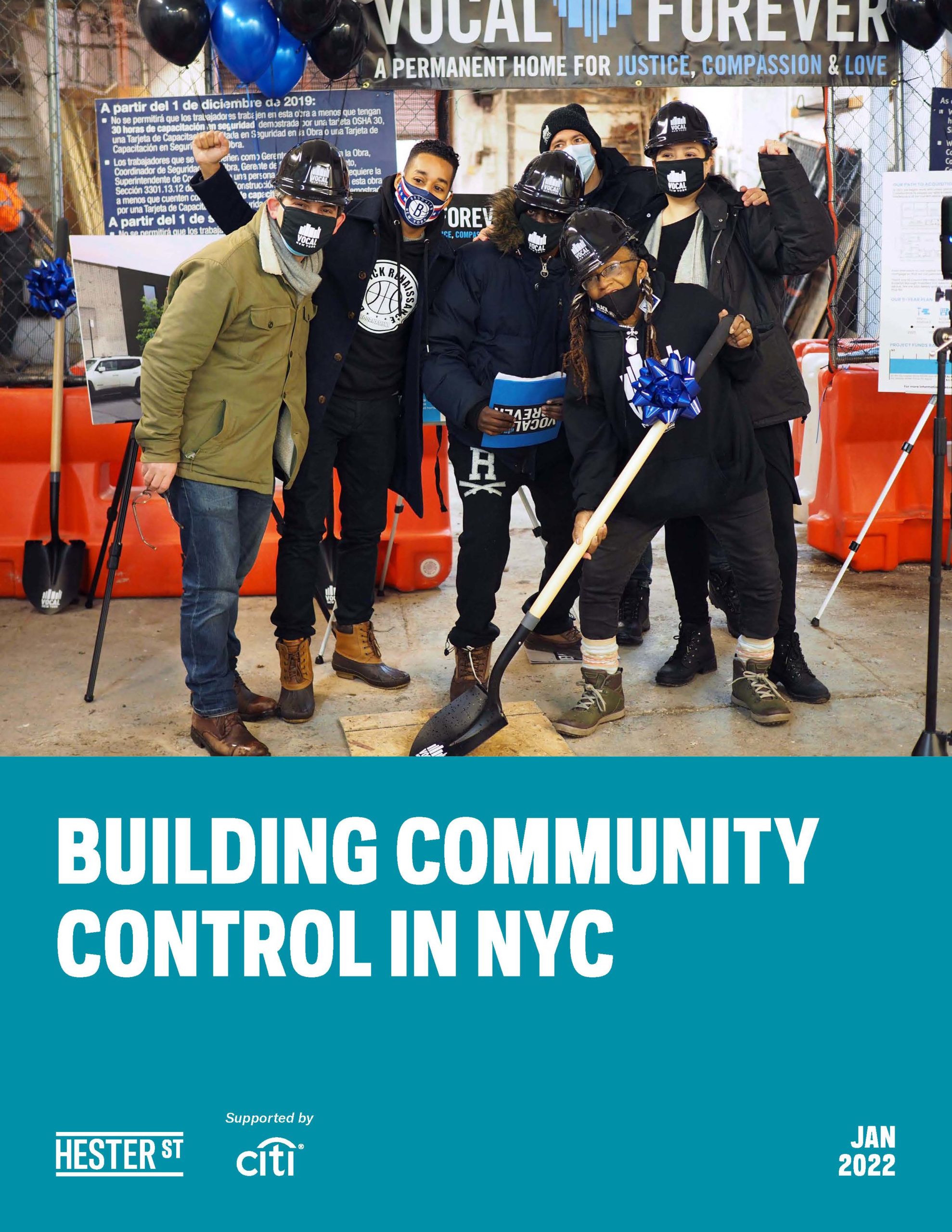HESTER STREET MAKES THE CASE FOR NONPROFIT OWNERSHIP & URGES THE CITY TO SUPPORT BLACK & BROWN NEIGHBORHOODS
New York, NY, January 13, 2022: Hester Street is pleased to announce the release of Building Community Control in NYC and Beyond, a new report that provides recommendations to build-out a nonprofit community control ecosystem of technical assistance, innovative pilot programs and reliable, low-risk funding, that supports the sustainable acquisition, renovation, and operation of space in neighborhoods at risk of heightened displacement. A continuation of Hester Street’s anti-displacement initiative work, the Report expands on their 2020 analysis of the NYC Capital Grants Program (CapGrants), Essential and At-Risk: The Power of Community-Based Organizations and the Danger of Displacement.
The aftereffects of the COVID-19 pandemic have increased the need for survival services in Black, Brown, immigrant, and low-income communities across New York City. Ongoing and intensifying economic, health, and climate events that disproportionately impact communities of color necessitate a powerful, nimble, and well-resourced network of community-based organizations (CBOs) and neighborhood institutions that support, organize, and inspire the neighborhoods they serve in times of both acute and everyday crisis.
Community control of neighborhood assets by non-profit organizations is the most durable strategy to retain and grow community wealth, increase resilience, preserve community space and culture, build local power, and to uplift the critical symbiotic relationship between government and community-based organizations. CBOs are conduits for the kinds of services and support that make for functional, healthy, and vibrant neighborhoods. And like much of NYC infrastructure, they require attention and investment. Rising rents due to gentrification, negligent and harassing landlords, and government underfunding pose an existential threat to this vital social infrastructure making the need for sustained, strategic intervention all the more pressing.
Key recommendations from the Report include:
– Increase the number of CBO offices and community spaces owned by nonprofits to reduce operating expenses and increase programs and services.
– Make City Capital Grants more accessible to CBOs in vulnerable neighborhoods.
– Pass needed legislation such as the NYS Tenant Opportunity to Purchase Act (TOPA) and the NYC Community Opportunity to Purchase Act (COPA), two community control and anti-displacement bills that together provide nonprofits, tenants, and CLTs with the legal right to purchase their building before other interested, qualified purchasers.
– Abolish the NYC Tax Lien Sale and other harmful legal systems that strip Black and Brown communities of wealth.
– Create a dedicated program in New York City to lead and anchor non-housing, CBO-led capital projects to ensure CBO success and support private and philanthropic funding to follow.
Arlenis Morel, Co-Executive Director of Make the Road NY, said “Implementation of this Community Control Proposal is a long-term investment in the social and economic growth, respect, and dignity of groups like Make the Road NY, and the communities we serve across NYC that are at-risk of gentrification and displacement. These are the communities that have been impacted for decades by top-down planning initiatives and went through the worst of the COVID-19 pandemic. This proposal will help bring together the resources needed for nonprofits to successfully complete capital acquisition and construction projects and, in the case of Make the Road NY, will only increase our ability to serve low-income immigrant residents in NYC for decades to come.”
“At VOCAL-NY, we know exactly how dangerous gentrification can be – we lost our home of 20+ years when developers bought our building and kicked us out to build luxury condos,” remarked Alyssa Aguilera, Co-Executive Director. “This report lays out a framework for how nonprofits like ours can fight back against rampant gentrification by utilizing government agencies, technical assistance providers, and financial institutions to support a path towards ownership. We know it works because it worked for us, and soon our organization will own our office and have a permanent home for our work for decades to come. We need these projects in every corner of the city.”
Arif Ullah, Executive Director of South Bronx Unite and Member of Mott Haven Port Morris Community Land Stewards, stated “As a community that has experienced decades of disinvestment and injustice, we understand that building real and lasting power requires taking control of public spaces and determining for ourselves how those spaces are used. A just city, an equitable city, a city for the people must be controlled by the people. We welcome the arrival of the Community Control Proposal, which provides valuable information, tools, and strategies to create that kind of city, where all communities can thrive.”
“Budget justice is critical to achieving community ownership and resiliency amid rising displacement and gentrification,” said Olivia Pipitone, Financing Director at Nonprofit Finance Fund, which has extensive experience providing bridge loans and other support to nonprofits that receive government funding. “Hester Street’s Building Community Control proposal is a timely call to strengthen NYC’s social infrastructure; New Yorkers deserve a funding system that advances racial equity and backs community-based organizations led by and serving people of color.”
Building Community Control in NYC and Beyond is supported by Citi Community Investing and Development, New York Community Trust, and the Booth Ferris Foundation. Additional thanks to planning researchers at NYU Furman Center, NYC Center for an Urban Future, and UC Berkeley Center for Community Innovation who contributed their experience and wisdom.
For press inquiries, please contact: Kristen Chin, Director of Community and Economic Development, at kristen@hesterstreet.org.
About Hester Street: Hester Street (HST) devotes urban planning, design and development expertise to support community-led change. We create and facilitate deeply democratic planning and policy making to advance racial and economic justice and to radically re-create cities shaped by low-income communities of color.


